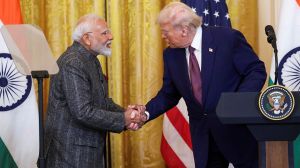Lessons in chemistry
Talk of Europe and you get a big yawn in Delhi. India8217;s annual summitry with Europe is always a cold dish amidst the warmth of India1...

Talk of Europe and you get a big yawn in Delhi. India8217;s annual summitry with Europe is always a cold dish amidst the warmth of India8217;s exciting engagement with the United States and China. When British Prime Minister Tony Blair arrives here tonight on behalf of the European presidency for the sixth India-EU summit, public interest will be focused on Britain rather than on Europe.
Blair8217;s half-a-day visit to Shimla, the old summer capital of the Raj, will surely get more television coverage than the unreadable India-EU declaration. While Indian awareness of Europe as a collective has certainly increased over the years, Euro-pessimism in London, Paris, Rome and elsewhere on the old continent reinforces Delhi8217;s frigidity towards Brussels.
High unemployment, low growth rates, opposition to migration of skilled labour, and the apparent inability to deal with the imperatives of globalisation amidst the rise of India and China have made the European economic future uncertain. Europeans feel trapped between aggressive American capitalism and perceived Asian mercantilism. As America threatens to widen its technological gap with Europe, China takes away manufacturing jobs and India eats into the service sector employment.
The stalling of the European project after the French and Dutch rejection of the constitutional treaty, the demographic decline, the challenge of assimilating a restive Islamic minority, and the emergence of home-grown terrorism, reinforce the image of Europe on the decline.
Those speculating on the future of world politics increasingly talk of a tripolar system shaped by the US, China and India. Europe and its great colonial powers that shaped our destiny for more than three centuries now seem condemned to become a quaint little ghetto on the north-western edge of Eurasia. Europe could perhaps manage its own decline in an orderly manner, much like Britain in the second half of the twentieth century, but is increasingly marginal to the global balance of power, analysts say.
Since the end of the Cold War, Europe itself has signaled that it no longer has the stomach for power politics. Much like the non-aligned India of the past, Europe began to talk of the primacy of global institutions and emphasise the rule of law. The new sense of security in Europe after the Cold War replaced the Hobbesian focus on realpolitik with the Kantian belief in perpetual peace. Possessed by a sense of the miracle at the new unity of its warring kingdoms, Europe believed it had entered the post-modern world of norms and could barely hide its contempt for the modernist obsession with power in Washington, Beijing and Delhi. The differentiation between its chancelleries and non-governmental organisations seemed to disappear as Europe preached to the rest of the world on the virtues of collective security, human rights and non-proliferation.
All this forced rising powers like India to either tune off from Europe, or treat it like a 8220;theme park8221; 8212; a high end tourist destination for Asia8217;s new rich focused on wineries, cuisine, castles and museums.
Is Europe, then, irrelevant? Not so fast. Despite the persistent political irritation that Brussels generates in Delhi, it will be a huge mistake for India to write off Europe or treat it as a mere boutique.
With barely twelve per cent of the world8217;s population, Europe still commands 40 per cent of the world8217;s GDP. While Europe is having problems with globalisation, its capacity to adapt is not exhausted. Europe remains a source of advanced technologies and modern arms. While the relative decline of Europe is inevitable, its capacity to influence the global balance of power in the coming decades will endure well into this century.
This recognition has made China reach out to Europe in a big way in recent years. While Europe and China fight many trade battles, including the latest 8220;bra wars8221;, Beijing is seeking to leverage European strengths to enhance its own national capabilities. As he prepares to meet Blair this week and the French President Jacques Chirac next in Paris, Prime Minister Manmohan Singh must press Europe to deepen the strategic partnership with India.
To be sure, the current strategic dialogue between India and the EU touches on all the right themes 8212; greater economic and commercial cooperation, joint efforts to combat terrorism and European support for Indian participation in the international nuclear fusion project. But the joint statement, pre-cooked by Brussels and Delhi, also reveals, if only inadvertently, that there is no big idea underpinning their strategic dialogue.
While India and Europe say they need each other, they are yet unprepared to pursue the logic to the end. If India needs to rise rapidly and Europe wants to stay relevant, they need to exploit, quickly and intensely, the economic, technological and demographic complementarities. The values of Enlightenment 8212; of scientific reason and individual freedom 8212; that India and Europe share have re-emerged as the bedrock for constructing any credible world order amidst the challenges of religious extremism and anti-modernism.
In order to capture the public imagination in both Europe and India about the prospects of strategic cooperation, they need to send clear political signals and unveil visible mega projects. Europe needs to acknowledge, much like the Bush Administration, that a stronger India is in the interest of global peace and stability. And in practice, Europe needs to go beyond the legalistic framework of non-proliferation and open the doors for long-term high technology and defence cooperation with India.
While Europe is desperate to sell nuclear reactors and advanced arms to China, it remains squeamish about genuine strategic cooperation with India. If Blair, on behalf of Brussels, recognises India8217;s role in shaping a new, long overdue post-Yalta international system, there will be no reason for him to 8220;sex up8221; Europe in his India sojourn. If he can get Brussels to loosen its controls over high technology trade with Delhi, Blair will find it easy to turn India on.
- 01
- 02
- 03
- 04
- 05































